Treatment
Since 2009, ReachAnother has helped provide surgery to more than 10,000 babies
We are giving new hope for TREATMENT TO parents and doctors
Folic acid occurs naturally in some fruits and vegetables and is added through fortified flour to bread products in many countries, including the United States. In Ethiopia, few expectant mothers receive sufficient folic acid in their diet or have access to folic acid supplements before and during pregnancy. This results in 44,000+ pregnancies affected by spina bifida and hydrocephalus each year resulting in the need for treatment.
We are committed to
Expanding pediatric neurosurgery capacity to save more lives
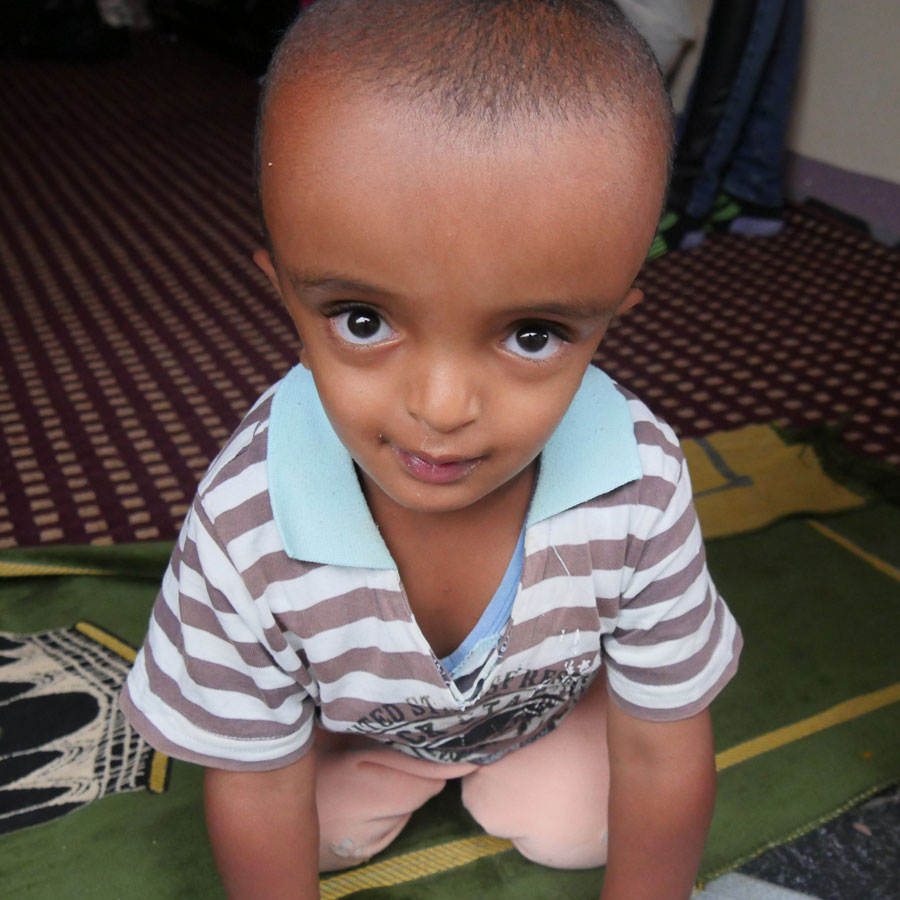
Life-Saving Surgery & Treatments
In 2011, in cooperation with neurosurgeons Drs. Hagos, Abat and Mersha, the first graduates from Addis Ababa University’s neurosurgery training program, ReachAnother launched the Hydrocephalus Campaign. This innovative initiative made operating rooms available on weekends for surgery on these overlooked babies.
Today, ReachAnother’s mission has expanded to also include aftercare, capacity-building and prevention awareness through our Centers of Excellence in Pediatric Neurosurgery program. Saving the lives of babies born with neural tube defects through surgical intervention remains our primary focus.
Supplying diagnostic equipment for early detection
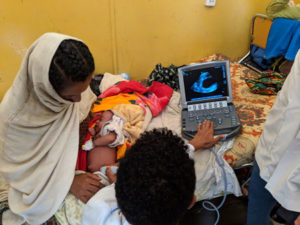 Ultrasound is a game changer in diagnosis and aftercare for babies with spina bifida and hydrocephalus. While this is a tool that we take for granted in the United States, until recently Ethiopia’s neurosurgeons had no access to this critical technology.
Ultrasound is a game changer in diagnosis and aftercare for babies with spina bifida and hydrocephalus. While this is a tool that we take for granted in the United States, until recently Ethiopia’s neurosurgeons had no access to this critical technology.
Ultrasound dramatically reduces the time needed to diagnose hydrocephalus so that it can be caught early and surgery can happen before permanent brain damage and other disabling symptoms occur. Prior to ultrasound, Ethiopian doctors relied on observing overt physical symptoms of the disease, such as head swelling, downward eye gaze, headaches, and vomiting. In many cases this was too late.
In partnership with SonoSite Corporation, ReachAnother has begun providing portable ultrasound machines to pediatric neurosurgeons and their teams. Today, doctors can use ultrasound to look through the window of the fontanel right after a baby is born and catch hydrocephalus early. This technology also significantly improves aftercare by easily allowing early detection of bladder problems and post-surgery complications.
Delivering essential medical instruments
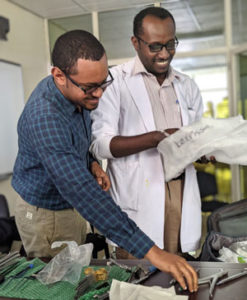 One continuing challenge that faces neurosurgeons in Ethiopia is access to medical equipment for ongoing treatment. We provide ”start-up kits” for many neurosurgeons, as well as many other needed tools, for other medical specialties, including ear, nose and throat; ophthalmology, gynecology, orthopedics and general surgery.
One continuing challenge that faces neurosurgeons in Ethiopia is access to medical equipment for ongoing treatment. We provide ”start-up kits” for many neurosurgeons, as well as many other needed tools, for other medical specialties, including ear, nose and throat; ophthalmology, gynecology, orthopedics and general surgery.
Since 2009, ReachAnother has donated and delivered over $1 million in medical equipment to hospitals in Ethiopia.
Providing training opportunities to raise medical standards
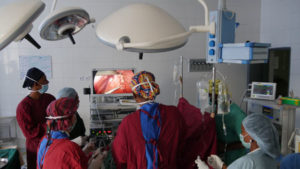 ETV Training – The alternative treatment to shunt placement
ETV Training – The alternative treatment to shunt placement
While shunts save the lives of babies with hydrocephalus every day, there is another surgical technique that provides a lower probability of infections and reduces the need for future corrective surgeries. This alternative treatment is called Endoscopic Third Ventriculostomy (ETV), which is a minimally invasive, solution that will expand the capacity of neurosurgeons to meet surgical needs.
ReachAnother partners with CURE Neuro to fund the training of our Centers of Excellence lead neurosurgeons in ETV surgery at a teaching hospital in Mbale, Uganda. CURE Uganda is the birthplace of the endoscopic treatment of hydrocephalus and is recognized as a global leader in this surgical technique.
Educating a new generation of pediatric neurosurgeons
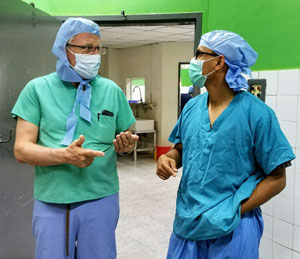 In 2009, we partnered with the new neurosurgeons of Addis Ababa University/Addis Ababa University Department of Neurosurgery to begin providing surgery for infants with spina bifida and hydrocephalus in tandem with training neurosurgeons in pediatric neurosurgery. At the time, there was only one neurosurgeon for the entire country of 90 million people.
In 2009, we partnered with the new neurosurgeons of Addis Ababa University/Addis Ababa University Department of Neurosurgery to begin providing surgery for infants with spina bifida and hydrocephalus in tandem with training neurosurgeons in pediatric neurosurgery. At the time, there was only one neurosurgeon for the entire country of 90 million people.
Today, there are 60 trained neurosurgeons in Ethiopia. As these surgeons spread throughout Ethiopia, they bring more neurosurgical care to all corners of the country, as well as new attitudes, knowledge, compassion and commitment that will enable all children with spina bifida and hydrocephalus to live long and productive lives.
Teaching nurses and PHYSICAL THERAPISTS about NTD prevention, treatment, and aftercare
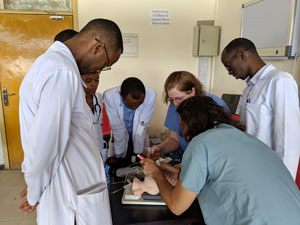 Even with life-saving surgery, children facing spina bifida and hydrocephalus need highly specialized care. One key component of our Center of Excellence program is training the medical staff with the tools to care for these children.
Even with life-saving surgery, children facing spina bifida and hydrocephalus need highly specialized care. One key component of our Center of Excellence program is training the medical staff with the tools to care for these children.
We have worked with international partners to develop curriculums for physical therapists and nurses to learn about the causes of neural tube defects, treatment regimes, prevention awareness, preparation for details of surgery and instructions for parents on how to care for their children effectively.
Supplying diagnostic equipment for early detection

Ultrasound is a game changer in diagnosis and aftercare for babies with SBH. While this is a tool that we take for granted in the United States, until recently Ethiopia’s neurosurgeons had no access to this critical technology. Ultrasound dramatically reduces the time needed to diagnose hydrocephalus so that it can be caught early, and surgery can happen before permanent brain damage and other disabling symptoms occur. Prior to ultrasound, Ethiopian doctors relied on observing overt physical symptoms of the disease, such as head swelling, downward eye gaze, headaches and vomiting. In many cases this was too late.
In partnership with SonoSite Corporation, ReachAnother has begun providing portable ultrasound machines to pediatric neurosurgeons and their teams. Today, doctors can use ultrasound to look through the window of the fontanel right after a baby is born and catch hydrocephalus early. This technology also significantly improves aftercare by easily allowing early detection of bladder problems and post-surgery complications.
Delivering essential medical instruments

One continuing challenge facing the neurosurgeons in Ethiopia is access to medical equipment. We provide ”start-up kits” for many neurosurgeons as well as many other needed specialized medical tools for other specialties such as ENT, ophthalmology, GYN, orthopedics and general surgery.
Since 2009, we have donated and delivered over $1M in medical equipment to hospitals in Ethiopia.
Providing training opportunities to raise medical standards

ETV training – the alternative to shunt placement
We partner with CURE Neuro at its teaching hospital in Mbale, Uganda and fund the training of our Centers of Excellence lead neurosurgeons in ETV surgery. CURE Uganda is the birthplace of the endoscopic treatment of hydrocephalus and is recognized as a global leader in the minimally-invasive, shuntless treatment for hydrocephalus.
Educating a new generation of pediatric neurosurgeons

In 2009, we partnered with the new neurosurgeons of Addis Ababa University/Addis Ababa University Department of Neurosurgery to begin providing surgery for SBH infants in tandem with training neurosurgeons in pediatric neurosurgery. At the time, there was only one neurosurgeon for the whole country of 90 million people.
Today, there are 40 trained neurosurgeons in Ethiopia. As these surgeons spread throughout Ethiopia they bring more neurosurgical care to all corners of the country, as well as new attitudes, knowledge, compassion and commitment that will enable all children with SBH to live long and productive lives.
Teaching nurses and PTs about NTD prevention, treatment and aftercare

Even with life-saving surgery, SBH (spina bifida and hydrocephalus) children need highly specialized care. One key component of our Center of Excellence program is training the medical staff in caring for these children.
We have worked with international partners to develop curriculums for physical therapists and nurses to learn about the causes of neural tube defects, treatment regimes, prevention awareness, preparation for details of surgery and instructions for parents on how to care for their children effectively.
“It was incredible to be able to volunteer in the hospital as a medical student and watch as the life of a child with hydrocephalus was forever changed with treatment. But it also gave me the chance to realize that giving a life to one child also means helping that child’s mother, father, family and loved ones. It provides the community with hope to know that someone cares and is willing to help.”
